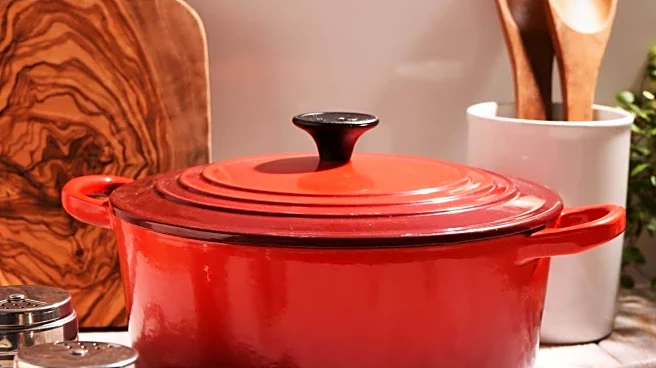What's Happening?
CNET has published an article advocating for the use of an oven to cook bacon, suggesting it as the superior method over traditional frying pans. The article highlights the benefits of baking bacon, which include achieving consistent crispiness and minimizing kitchen mess. The process involves preheating the oven to 400 degrees Fahrenheit, lining a baking tray with aluminum foil or using a nonstick sheet pan, and arranging the bacon strips without overlapping. The bacon is then baked for 8 to 10 minutes, with adjustments based on personal preference for crispiness. The article also mentions the use of countertop convection ovens and air fryers as alternative methods for cooking bacon, emphasizing the ease and cleanliness of these approaches.
Why It's Important?
The recommendation to bake bacon instead of frying it in a pan addresses common issues such as uneven cooking and grease splatter, which can lead to a messy kitchen environment. By promoting a cleaner and more efficient cooking method, the article appeals to home cooks seeking convenience and consistency. This shift in cooking technique could influence consumer behavior, potentially increasing the demand for nonstick bakeware and countertop convection ovens. Additionally, the emphasis on reducing kitchen mess aligns with broader trends in home cooking that prioritize ease and efficiency, reflecting changing consumer preferences in the culinary space.
What's Next?
As more people adopt the oven-baked method for cooking bacon, there may be increased interest in related kitchen products, such as nonstick bakeware and multifunctional countertop ovens. Manufacturers and retailers could respond by highlighting these products' benefits in marketing campaigns. Additionally, culinary influencers and cooking shows might further popularize this method, leading to wider acceptance and practice among home cooks. The trend could also inspire further exploration of alternative cooking methods for other traditionally fried foods, contributing to ongoing innovation in home cooking techniques.
Beyond the Headlines
The shift towards baking bacon instead of frying it in a pan may have broader implications for home cooking practices. It reflects a growing awareness of the importance of reducing kitchen mess and improving cooking efficiency. This trend could lead to a reevaluation of other traditional cooking methods, encouraging home cooks to seek out cleaner and more efficient alternatives. Furthermore, the emphasis on convenience and consistency in cooking aligns with the increasing demand for time-saving solutions in busy households, potentially influencing future developments in kitchen technology and culinary education.









